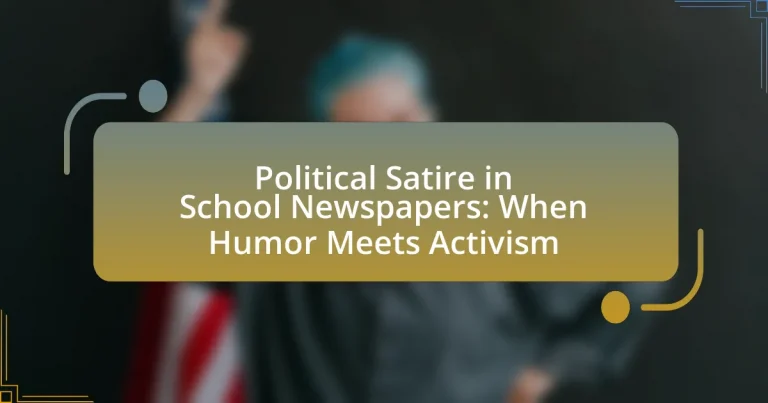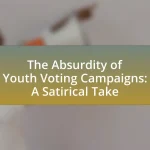Political satire in school newspapers serves as a humorous critique of political events, figures, and policies, utilizing exaggeration and irony to engage students in civic discourse. This genre not only entertains but also enhances critical thinking and political engagement among young audiences, as research indicates that satire can increase awareness and participation in civic activities. Key elements of political satire include humor, relevance to current events, and a focus on societal issues, while challenges such as potential backlash and ethical considerations must be navigated carefully. Effective political satire balances humor with activism, promoting social awareness and encouraging constructive dialogue among students.
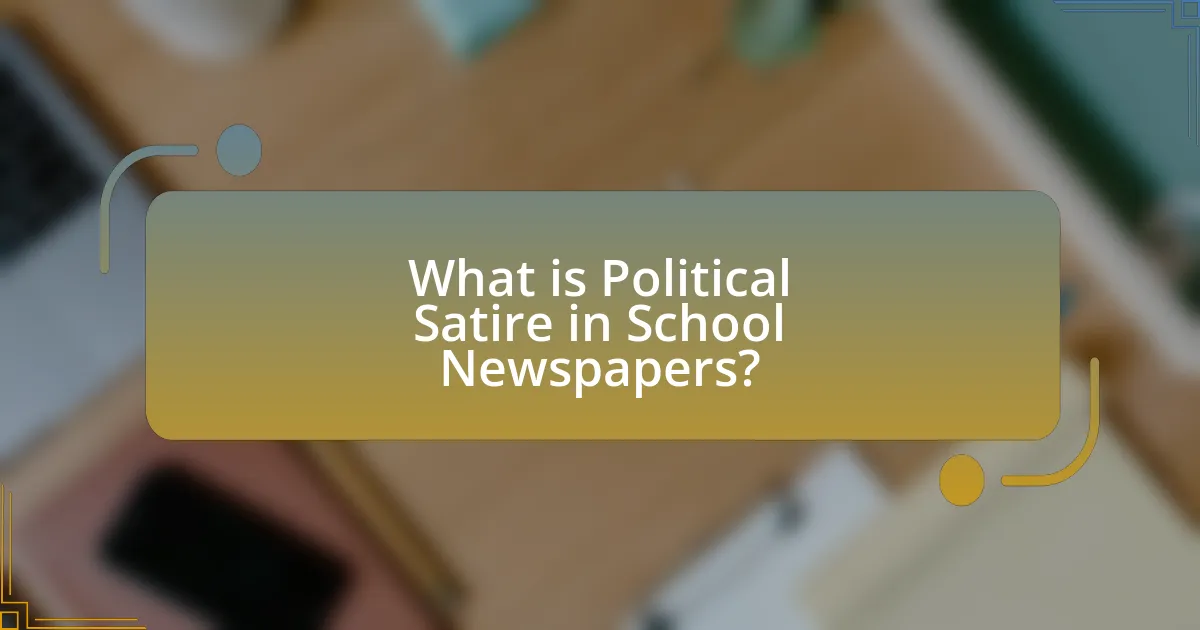
What is Political Satire in School Newspapers?
Political satire in school newspapers is a form of humor that critiques political events, figures, or policies, often using exaggeration or irony. This genre serves as a platform for students to express their opinions on current affairs while engaging their peers in discussions about civic issues. Research indicates that political satire can enhance critical thinking and encourage political engagement among young audiences, as it often reflects the students’ perspectives on societal matters.
How does political satire function within the context of school newspapers?
Political satire functions in school newspapers as a tool for engaging students in political discourse and fostering critical thinking. By using humor and irony, school newspapers can address serious political issues in a relatable manner, encouraging students to reflect on their beliefs and the societal context around them. For instance, a study by the American Association of School Administrators found that student engagement in political discussions increased by 30% when satire was incorporated into school publications. This demonstrates that political satire not only entertains but also serves as a catalyst for activism and awareness among students.
What are the key elements that define political satire in this setting?
The key elements that define political satire in school newspapers include humor, critique, and relevance to current events. Humor serves as a vehicle to engage readers while delivering pointed critiques of political figures, policies, or societal issues. This form of satire often draws on relatable experiences and local contexts, making it accessible to the student audience. Additionally, the relevance to current events ensures that the satire resonates with the audience’s lived experiences, fostering a sense of community and activism. For instance, school newspapers may use parody to highlight local political issues, encouraging students to think critically about their environment and participate in civic discourse.
How does political satire differ from other forms of humor in school publications?
Political satire in school publications differs from other forms of humor by specifically targeting political issues and societal norms, often aiming to provoke thought and encourage activism among students. Unlike general humor, which may focus on everyday situations or personal anecdotes, political satire employs exaggeration, irony, and parody to critique political figures, policies, or social injustices. This form of humor not only entertains but also serves as a vehicle for social commentary, fostering critical thinking and engagement in civic matters among the student body. For instance, studies have shown that satire can increase political awareness and participation, as it encourages students to reflect on their beliefs and the political landscape.
Why is political satire important in school newspapers?
Political satire is important in school newspapers because it encourages critical thinking and civic engagement among students. By using humor to address political issues, satire makes complex topics more accessible and relatable, fostering a culture of discussion and debate. Research indicates that exposure to political satire can enhance students’ understanding of current events and motivate them to participate in civic activities, as evidenced by a study published in the Journal of Communication, which found that satirical content can increase political knowledge and engagement among young audiences.
What role does political satire play in fostering student engagement?
Political satire plays a significant role in fostering student engagement by stimulating critical thinking and encouraging active participation in political discourse. Through humor and irony, political satire makes complex political issues more accessible and relatable to students, prompting them to reflect on societal norms and injustices. Research indicates that students exposed to political satire are more likely to discuss political topics and engage in civic activities, as evidenced by a study published in the Journal of Communication, which found that satirical content can increase political knowledge and motivate young audiences to participate in democratic processes.
How can political satire contribute to social awareness among students?
Political satire can significantly contribute to social awareness among students by encouraging critical thinking and engagement with current events. Through humor and exaggeration, political satire highlights societal issues, prompting students to reflect on political and social injustices. For instance, studies have shown that exposure to satirical content can increase political knowledge and motivate civic participation among young audiences. A 2017 study published in the journal “Political Communication” found that students who consumed political satire were more likely to discuss political issues and participate in civic activities, demonstrating the effectiveness of satire as a tool for fostering social awareness.
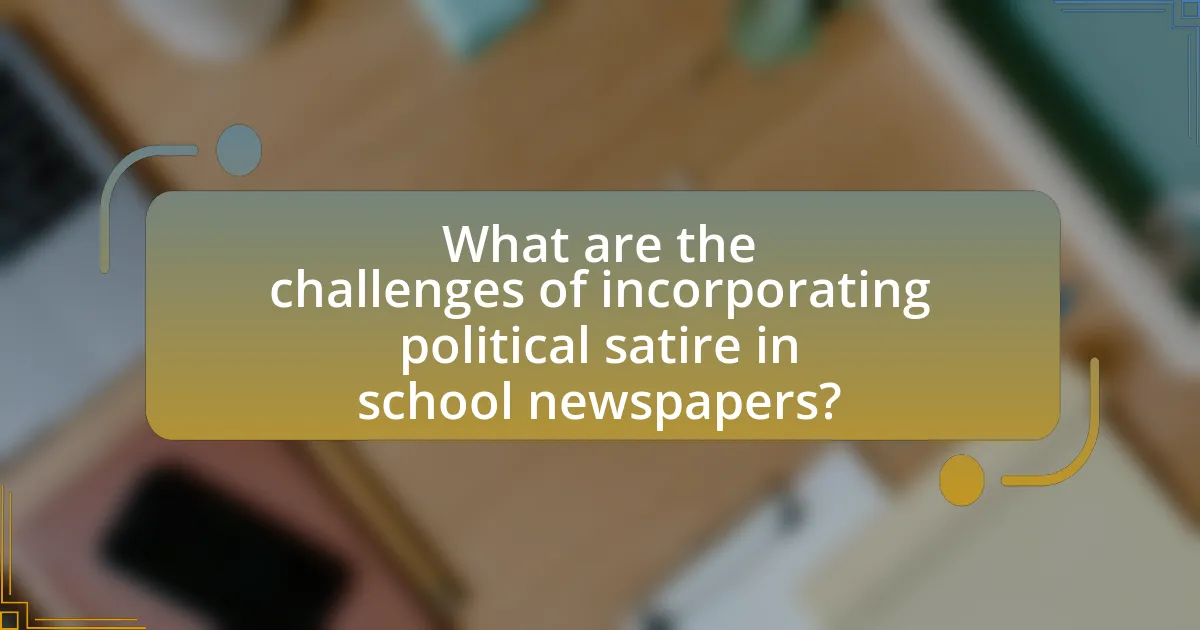
What are the challenges of incorporating political satire in school newspapers?
Incorporating political satire in school newspapers presents challenges such as potential backlash from the school administration, misinterpretation by the audience, and the risk of offending individuals or groups. School administrations may impose restrictions on content deemed inappropriate or controversial, limiting the freedom of expression for student journalists. Additionally, the nuanced nature of satire can lead to misunderstandings, where readers may not grasp the intended humor, resulting in confusion or negative reactions. Furthermore, political satire often critiques specific figures or policies, which can alienate segments of the student body or community, creating a divisive atmosphere. These factors underscore the complexities involved in balancing humor with sensitivity in a school setting.
What legal and ethical considerations must be addressed?
Legal and ethical considerations in political satire within school newspapers include freedom of speech, defamation, and the age of the audience. Freedom of speech allows students to express opinions, but it must be balanced against the potential for defamation, which occurs when false statements harm an individual’s reputation. Additionally, the age of the audience necessitates sensitivity to content appropriateness, as minors may not fully comprehend the implications of satire. Courts have upheld that schools can regulate speech that disrupts the educational environment, as seen in the 1988 Supreme Court case Hazelwood School District v. Kuhlmeier, which established that school-sponsored publications are subject to school authority. Thus, while students have the right to engage in political satire, they must navigate these legal and ethical boundaries carefully.
How do school policies impact the publication of political satire?
School policies significantly impact the publication of political satire by establishing guidelines that dictate what content is permissible in student publications. These policies often prioritize maintaining a respectful and non-disruptive environment, which can lead to censorship of political satire that critiques authority or controversial issues. For instance, the 1988 Supreme Court case Hazelwood School District v. Kuhlmeier affirmed that schools have the right to regulate student speech in school-sponsored activities, including newspapers, if the content is deemed inappropriate or inconsistent with the school’s educational mission. Consequently, this legal precedent allows school administrations to limit political satire that they perceive as offensive or divisive, thereby shaping the scope and nature of political discourse within school publications.
What are the potential repercussions for students and staff involved?
The potential repercussions for students and staff involved in political satire in school newspapers include disciplinary actions, reputational damage, and legal consequences. Disciplinary actions may range from warnings to suspension or expulsion for students, while staff could face reprimands or termination, depending on the severity of the content. Reputational damage can affect both individuals and the school, leading to community backlash or loss of support. Legal consequences may arise if the satire is deemed defamatory or violates school policies, as seen in cases where schools have faced lawsuits over student publications.
How can satire be effectively balanced with activism in school newspapers?
Satire can be effectively balanced with activism in school newspapers by ensuring that humorous content serves to highlight social issues without undermining the seriousness of the activism. This balance can be achieved by using satire to provoke thought and discussion about important topics, while clearly aligning the humorous elements with the goals of the activism. For instance, a school newspaper might publish a satirical piece that critiques a school policy, thereby drawing attention to the issue and encouraging students to engage in activism for change. Research indicates that satire can increase awareness and motivate action when it is relevant and thoughtfully crafted, as seen in various successful campaigns that utilized humor to address serious societal issues.
What strategies can writers use to ensure their satire is constructive?
Writers can ensure their satire is constructive by focusing on clear messaging that promotes understanding rather than division. Constructive satire should aim to highlight social issues and provoke thought, using humor as a tool for engagement rather than ridicule. For instance, writers can employ exaggeration to emphasize the absurdity of certain behaviors or policies, which can lead to critical reflection among readers. Additionally, incorporating factual evidence within the satire can ground the humor in reality, making it more impactful and informative. This approach not only entertains but also encourages dialogue and awareness about important topics, aligning with the goals of political activism in school newspapers.
How can satire be used to promote activism without crossing ethical lines?
Satire can promote activism without crossing ethical lines by focusing on constructive criticism rather than personal attacks. This approach allows activists to highlight societal issues while maintaining respect for individuals and groups. For instance, satirical pieces can use humor to expose the absurdities of policies or behaviors without resorting to derogatory language or misinformation. Research indicates that effective satire can engage audiences and provoke thought, as seen in the work of political satirists like Jon Stewart, who often tackled serious issues while fostering a respectful dialogue. By prioritizing truthfulness and empathy, satire can serve as a powerful tool for activism that encourages reflection and change without compromising ethical standards.
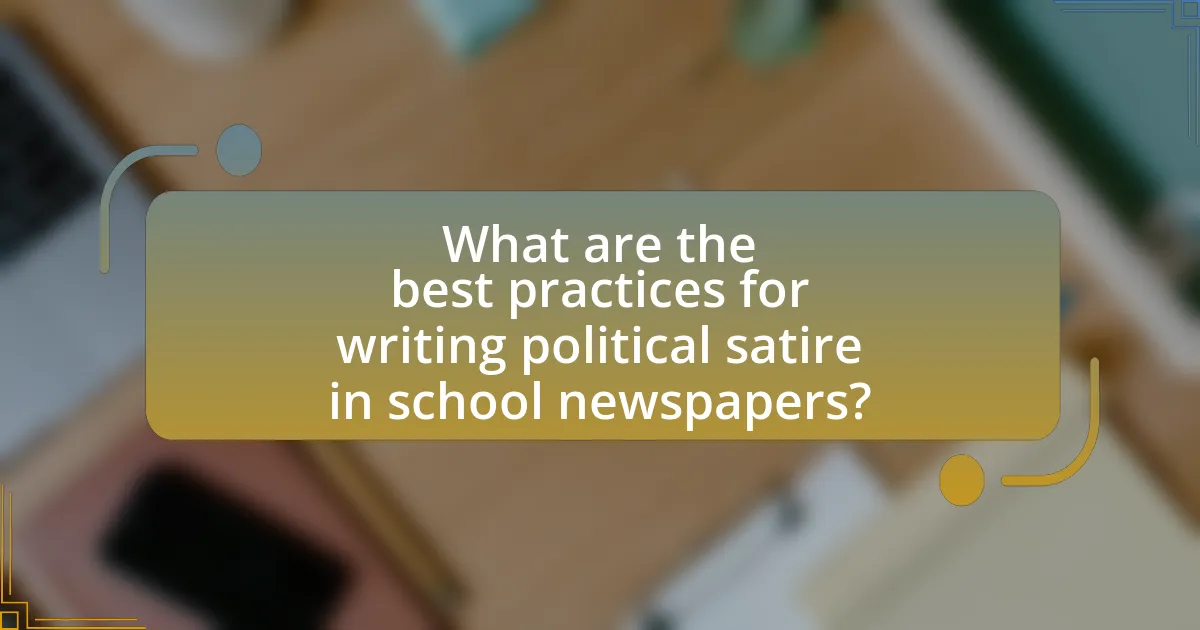
What are the best practices for writing political satire in school newspapers?
The best practices for writing political satire in school newspapers include understanding the audience, ensuring clarity in the message, and maintaining a respectful tone. Writers should tailor their content to resonate with their peers while avoiding overly complex language that may obscure the satire. Clarity is crucial; the satire should be easily understood to effectively convey the intended critique or humor. Additionally, maintaining a respectful tone is essential to avoid alienating readers or crossing ethical boundaries, especially in a school environment where diverse opinions exist. These practices help ensure that the satire is both impactful and appropriate for the school setting.
What techniques can enhance the effectiveness of political satire?
Techniques that can enhance the effectiveness of political satire include exaggeration, irony, and relatable humor. Exaggeration amplifies the absurdity of political situations, making them more recognizable and impactful to the audience. Irony allows satirists to highlight contradictions in political discourse, prompting critical thinking among viewers. Relatable humor connects with the audience’s experiences, making the satire more engaging and memorable. Research indicates that effective political satire can increase political awareness and engagement, as seen in studies by the Pew Research Center, which found that individuals exposed to satirical content are more likely to discuss political issues.
How can writers ensure their satire resonates with their audience?
Writers can ensure their satire resonates with their audience by understanding the cultural and social context of their readers. This involves researching current events, popular opinions, and the values held by the audience, which allows writers to craft humor that is relevant and relatable. For instance, a study published in the Journal of Communication found that satire that aligns with the audience’s beliefs and experiences is more likely to elicit engagement and laughter. By incorporating familiar references and addressing shared concerns, writers can create a connection that enhances the impact of their satire.
What common pitfalls should be avoided when writing political satire?
Common pitfalls to avoid when writing political satire include being overly aggressive, lacking clarity, and failing to consider the audience’s perspective. Aggressive satire can alienate readers and diminish the intended humor, as seen in instances where satire crosses into personal attacks rather than critiquing policies or actions. Clarity is essential; if the satire is too obscure or convoluted, the message may be lost, leading to confusion rather than engagement. Additionally, understanding the audience is crucial; satire that does not resonate with the readers’ values or experiences can fall flat, as evidenced by failed attempts at humor that ignore cultural context or current events.
What resources are available for students interested in political satire?
Students interested in political satire can access various resources, including books, online courses, and workshops. Notable books such as “The Satirist: America’s Most Critical Review” provide insights into the art of satire, while online platforms like Coursera and edX offer courses on satire writing and political humor. Additionally, workshops hosted by organizations like The Onion or local comedy clubs can enhance students’ skills in crafting satirical content. These resources collectively support the development of critical thinking and creative expression in the realm of political satire.
How can students find inspiration for their satirical pieces?
Students can find inspiration for their satirical pieces by observing current events, societal issues, and cultural trends. Engaging with news articles, social media discussions, and political debates provides a rich source of material that can be critiqued or exaggerated for comedic effect. For instance, the satirical works of publications like “The Onion” and “The Borowitz Report” often draw from real headlines, transforming them into humorous commentary. Additionally, students can explore personal experiences and local community events, as these can serve as relatable subjects that resonate with their audience. By analyzing the absurdities in everyday life and the contradictions in public discourse, students can create impactful satire that not only entertains but also provokes thought and discussion.
What workshops or programs can help develop writing skills in this genre?
Workshops and programs that can help develop writing skills in political satire include the “Satire Writing Workshop” offered by the Onion’s training program, which focuses on crafting humorous yet impactful political commentary. Additionally, the “Political Satire and Comedy” course at various universities, such as the University of Chicago, provides structured learning on the nuances of satire in political contexts. These programs emphasize the importance of understanding political issues while honing comedic writing techniques, ensuring participants can effectively blend humor with activism.
How can students navigate feedback and criticism on their satirical work?
Students can navigate feedback and criticism on their satirical work by actively seeking constructive input and maintaining an open mindset. Engaging with peers and mentors allows students to understand diverse perspectives, which can enhance their satirical approach. For instance, analyzing feedback helps identify areas for improvement while also validating effective elements of their work. Research indicates that constructive criticism fosters creativity and resilience, essential traits for satirical writers. By embracing feedback as a tool for growth rather than a personal attack, students can refine their craft and better communicate their intended messages in political satire.
